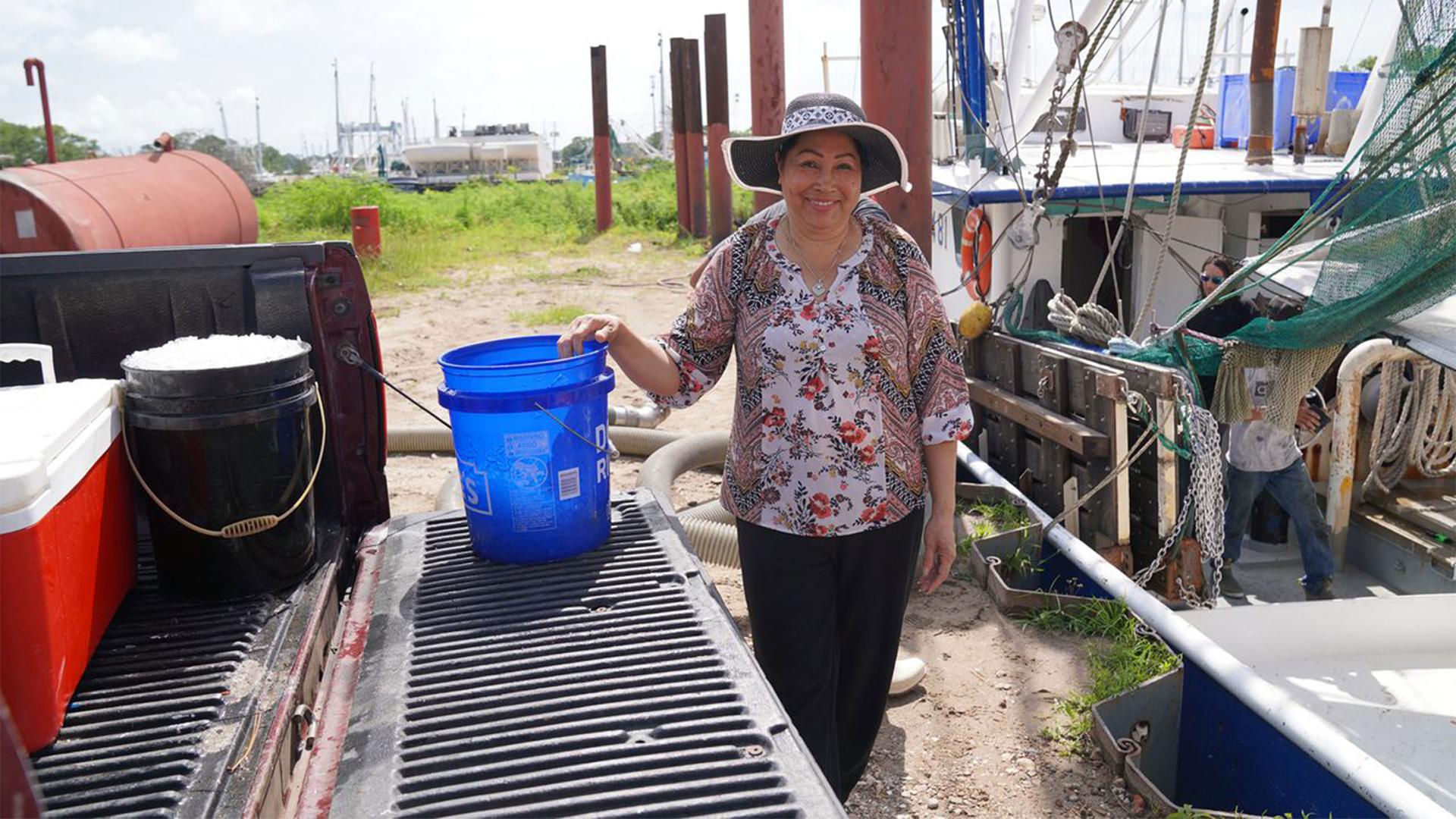This story was originally published by AL.com.
At the boat dock in Bayou La Batre Alabama, shrimp boat Captain Truc Le unties a thick mooring line attached to his blue and white vessel, with the name “Lucky Kim” painted on the side.
Le, his wife and son are at the dock to restock the ice that cools their shrimp catch. Le has continued fishing throughout the pandemic. He wasn’t too nervous about COVID-19, but his family members were, so he got a vaccine, he said.
“They’re worried that if they don’t vaccinate, they will easily catch the virus,” Le, who does not speak English, said in Vietnamese.
Alabama has the second-to-lowest COVID-19 vaccination rates in the nation. But Le’s small Vietnamese immigrant community along the Gulf of Mexico has taken a different approach.
Community leaders estimate almost every eligible person — upwards of 90% of eligible Vietnamese Americans in Alabama — have gotten the shot. That’s compared to just 34% of all Alabamians.
Related: Is Vietnam the coronavirus-fighting champ of the world?
“People around us, most of them got vaccinated,” she said in Vietnamese, through a translator. “They told me if I get vaccinated, the percentage [chance] of getting COVID-19 is low.”
There are about 4,000 Vietnamese people in this region of Alabama, and roughly 900 in Bayou La Batre, community leaders estimate. Nguyen says she sees other members of the local Vietnamese community at holidays, like New Year’s, at the local Vietnamese community center and in their homes, especially when family or friends come by.
She says her lack of English is the most challenging part of living in the US.
In southern Alabama, many Vietnamese, like Le and Nguyen, work in the fishing industry. They immigrated to the Louisiana, Mississippi and Alabama Gulf during a wave of migration in the 1980s when the US allowed refugees to immigrate after the Vietnam War.
Le’s son, who works on the boat with his father, said he is planning to get the vaccine, mostly because his family wants him to. Le’s wife, Phuong Thi Nguyen, loads ice into coolers near an industrial ice machine at the dock. She said her daughter helped her get an appointment for a vaccine in Mobile because she does not speak English.
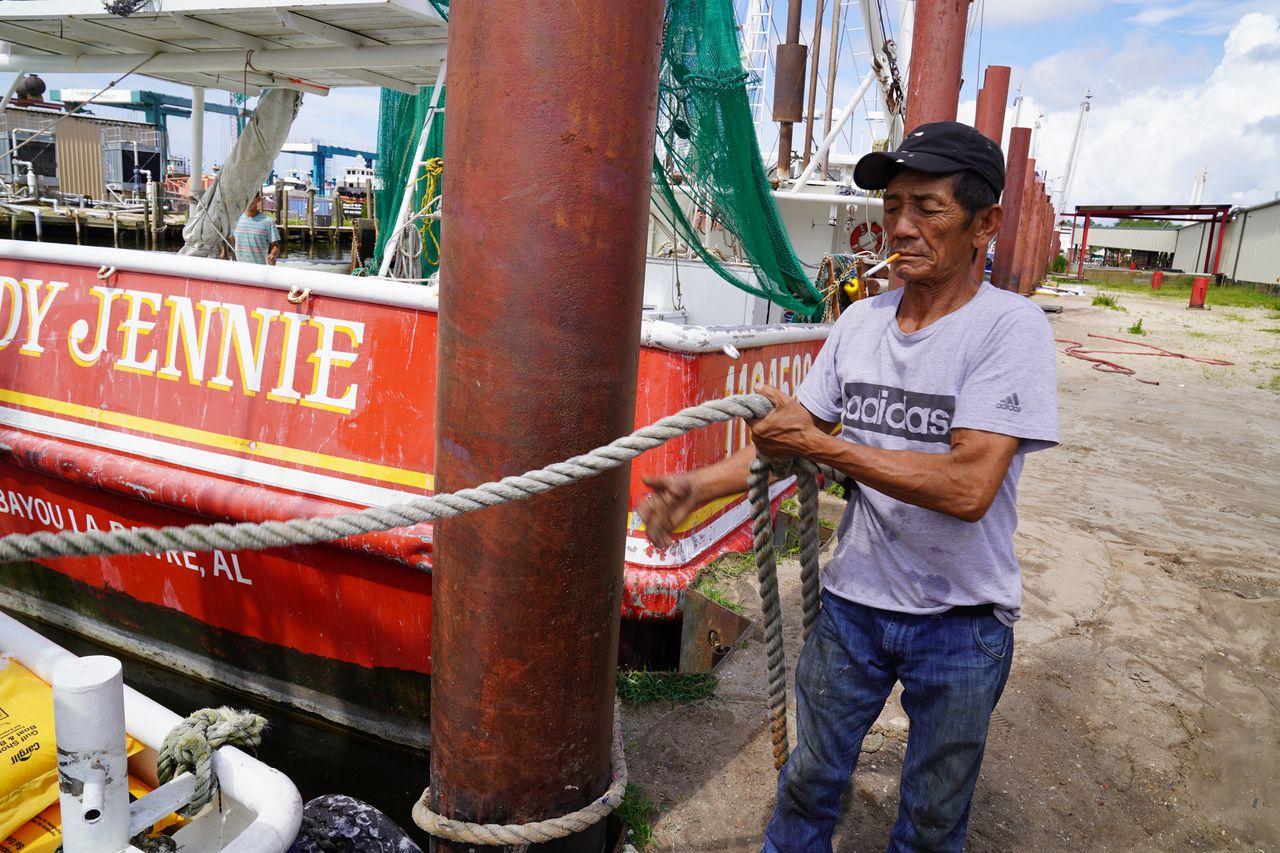
Daniel Le, director of the Gulf chapter of Boat People SOS, a national group that assists Vietnamese immigrants in the United States, said many Vietnamese in this part of the country take COVID-19 seriously. They’ve observed the restrictions and they listen to scientists
“Culturally, in general, Vietnamese believe in health care providers,” said Le. “They know the health care provider knows what’s best for them.”
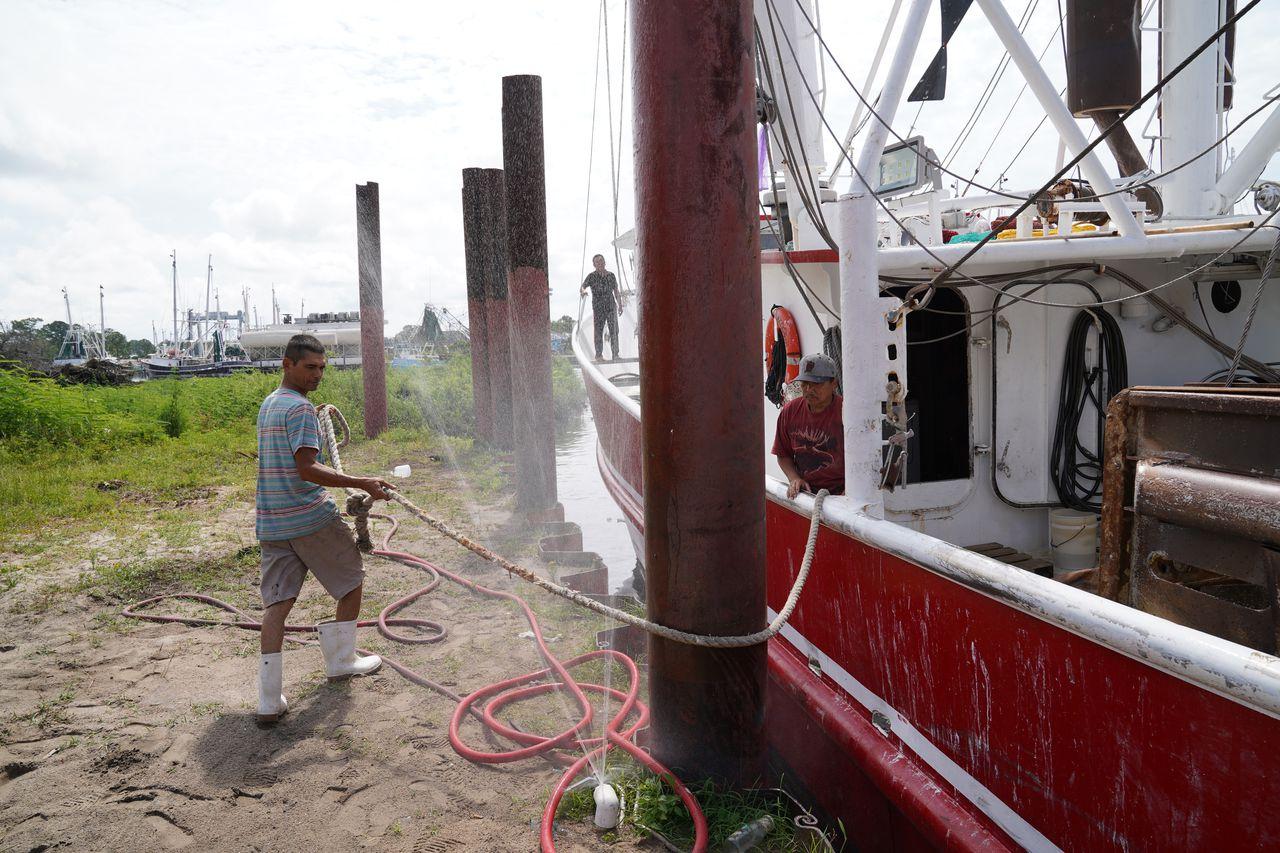
Early adopters in Bayou La Batre
At Bayou Pharmacy, across town from the docks, Vietnamese customers typically make up a minority of shoppers at the store, about 15%, but they became the majority when vaccines arrived, said pharmacy technician Courtney Moore.
“In the beginning of the vaccine, we would have days of like 80 people [getting vaccinated], and 70 would be Vietnamese.”
“In the beginning of the vaccine, we would have days of like 80 people, and 70 would be Vietnamese,” she said.
It was Moore’s job to cull through the waitlist in early 2021, back when vaccines were in high demand.
“We have one of the only pharmacies with a Vietnamese-speaking person; now we have two,” said Moore, whose mother is Vietnamese. “People are more comfortable with the language barrier.”
The pharmacy organized vaccinations over the phone and by paper, helping ease the language and digital access barriers that would have existed with online scheduling.
Pharmacist Rubesh Patel said Vietnamese people in Bayou La Batre are more willing to get all kinds of vaccinations.
“A lot of them are patients here anyway, so they tell their family members, I get my medicine there, ‘I trust them,’” he said.
At Accordia Health, a local health clinic, about 35% of Dr. Rajesh Gujjula’s patients are Vietnamese.
Many of his non-Vietnamese patients have waited to get a shot, he said. Mobile County statistics are slightly lower than the state’s with about 30% of the overall population vaccinated.
His Vietnamese patients mostly got vaccinated on their own initiative.
“Their friends got it, that’s the pretty standard answer you get,” he said. “Or it’s their family that made them get the vaccine.”
Nationally, there is little data on vaccinations among Vietnamese immigrants, said Dr. Tung Nguyen, a professor of medicine at UC San Francisco.
“In general, vaccine uptake tends to be higher among Asian Americans if access is not a problem.”
“We don’t really have any survey data regarding Vietnamese Americans and COVID vaccinations,” he said in an email. “In general, vaccine uptake tends to be higher among Asian Americans if access is not a problem.”
Related: Students push for adding Asian American history to school curriculums across the US
Buddhist monk sets an example
On the outskirts of town, a Buddhist temple sits back from the road. It is a yellow trailer with a red, gabled roof built over the porch. The front lawn is scattered with magnolia and mimosa trees and large statues of Buddha.
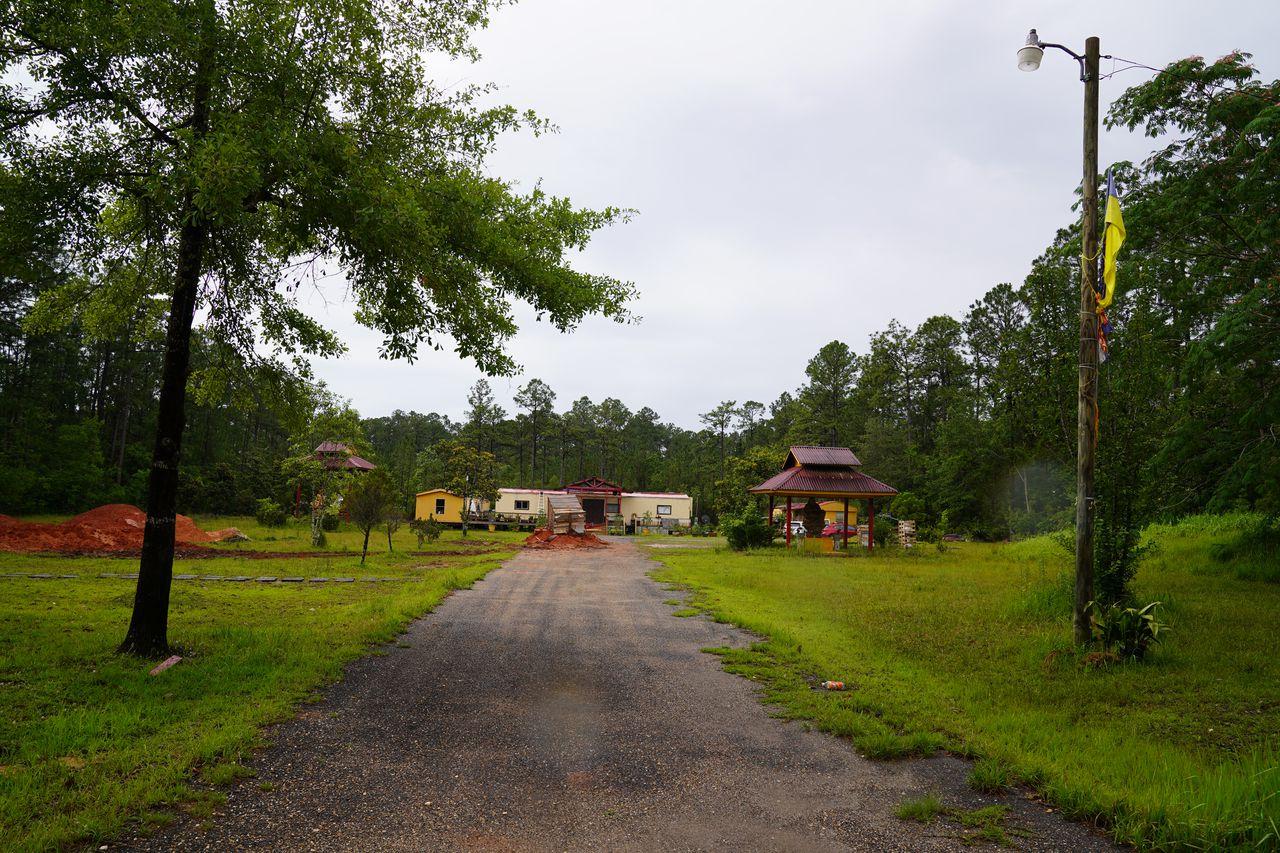
The temple ceiling was damaged by a hurricane last fall, and now there’s mold growing on the roof. Monk Bon Le said if it weren’t for the storm damage, his congregation would be meeting again for nightly study.
They are almost entirely vaccinated. He said he believes in the science behind the vaccine and has encouraged his congregants to get it. He used himself as an example, and most followed.
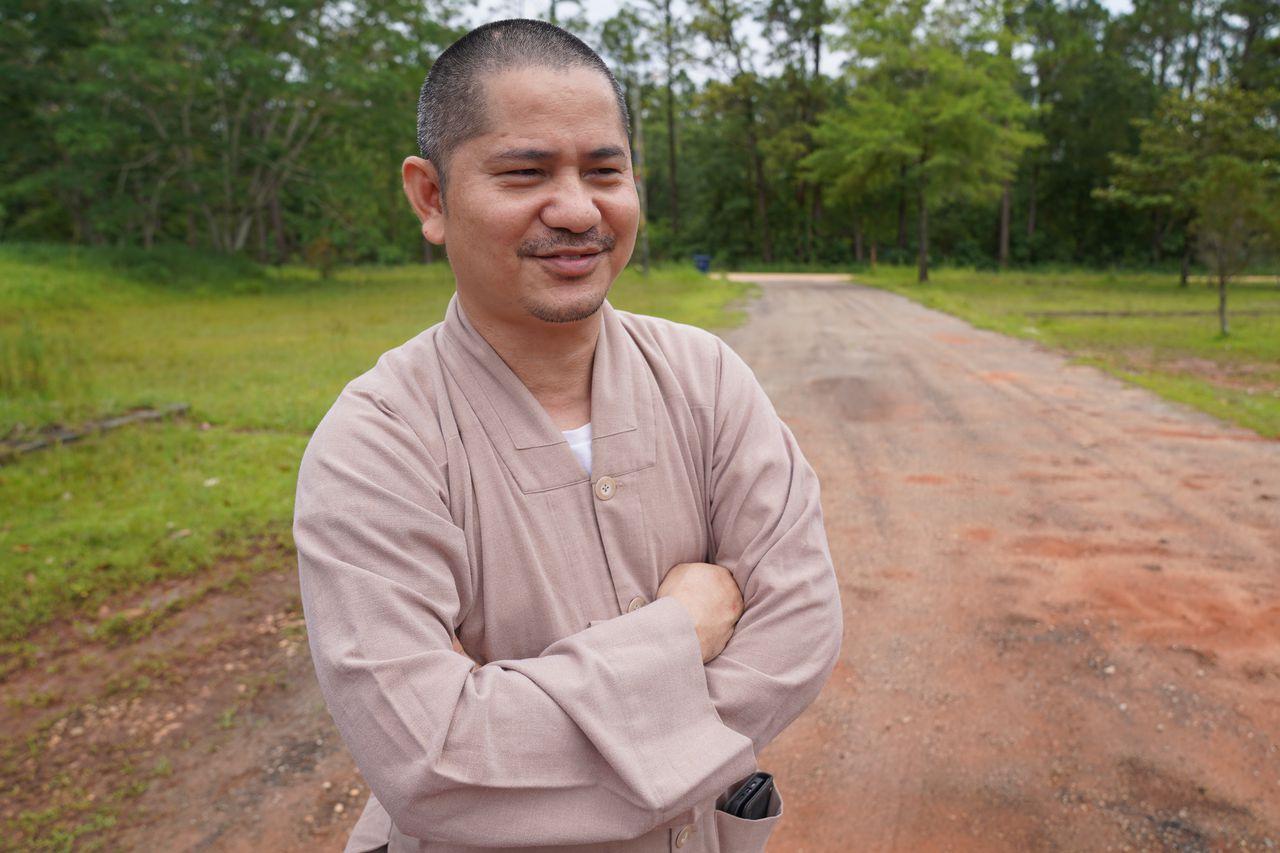
Spreading the word
Ana Chau works in an oyster shucking processing plant with about 30 people. Her plant limited workdays to twice a week due to COVID-19, but still, she was afraid of contracting the virus at work.
“Once I heard the news that I would be able to get the vaccine, I went to the pharmacy where they directed me to,” she said.
Chau came to the United States from Vietnam in 1992 under a law that allowed the children of American soldiers, like her father, to get priority for immigration.
She is a well-connected member of Bayou La Batre’s Vietnamese community. She often serves as a volunteer to spread the word for Boat People SOS when they’re trying to educate the community about something.
Related: Charges dropped against Congolese Canadian doctor accused of starting COVID outbreak
“When I got mine, I got home and [made a] phone call to all the numbers I know, to advise them to go schedule the vaccine to spread the word.”
There were a few deaths from COVID-19 in the Vietnamese community, and some people are suffering from long-term effects of the disease. That scared a lot of people, said Boat People SOS community health worker Kim-Lien Tran.
Tran was born in Vietnam, and her family immigrated to New Orleans in 1975 when she was a toddler. New Orleans, along with Biloxi and Bayou La Batre, are centers of Vietnamese immigration along the Gulf.
“I grew up in a big Vietnamese community. … “Even if they don’t know who you are, they just help you without even thinking of anything.”
“They’re very close-knit,” said Tran of the Vietnamese communities she’s been a part of. “They’re always there for each other. It’s a welcoming thing to see. I grew up in a big Vietnamese community, so I know how it feels,” she said. “Even if they don’t know who you are, they just help you without even thinking of anything.”
Still, Tran doesn’t consider Vietnamese American culture more community-minded than American culture.
“I think that’s a stereotype. It depends where you are. American culture is very tight-knit, too.”
In her role, Tran helps non-English speakers access health care and translate basic documents, like tax forms. She serves as a go-between for local government and state agencies, including the health department.
She helps Vietnamese people fill out government applications for energy assistance. Many work long hours in nail salons and seafood plants, and have little time to learn English, which is a barrier for their lives here.
Vietnamese-language sources spread some misinformation about vaccines, particularly on YouTube. At their office, they hand out information from the CDC in Vietnamese. That’s been mostly effective.
Related: COVID sparks a new ‘right to food’ movement across the globe
“They think about their family members. A lot of them have chronic disease.”
“They think about their family members. A lot of them have chronic disease,” she said of the mostly older population that lives here. And they think about returning to normal and their need to work.
Meanwhile in Vietnam, case numbers had been in the low thousands until a recent uptick in cases following the spread of a variant. The military enforced COVID-19 restrictions, shutting down residential blocks following a known infection.
Strict COVID-19 measures in Asian countries like Vietnam were a good model for the pandemic, said Phu Nguyen, a senior in the community. He immigrated in 2013 to live with his children in Bayou La Batre.
“Too much freedom causes us to not be cautious about it, so COVID can easily spread through our carelessness.”
Nguyen worked as an oyster shucker until last year when he got laid off due to COVID-19. Now that he’s vaccinated, he’s hoping to start a new job immediately.
“After I got vaccinated, I feel a little safer to go out and go to work.”
Our coverage reaches millions each week, but only a small fraction of listeners contribute to sustain our program. We still need 224 more people to donate $100 or $10/monthly to unlock our $67,000 match. Will you help us get there today?
